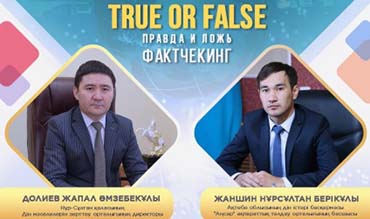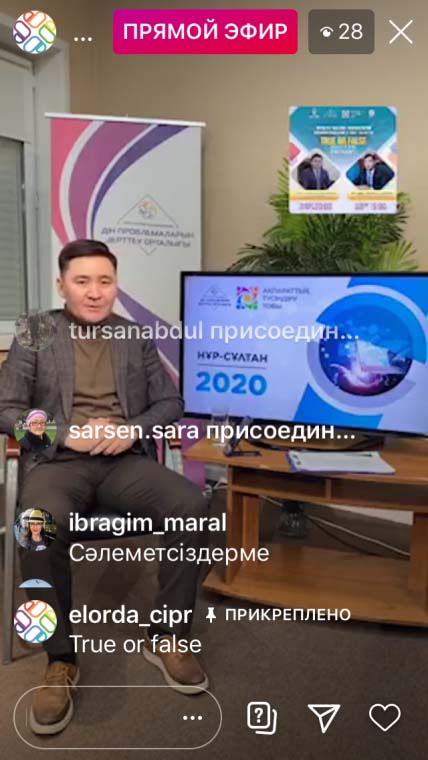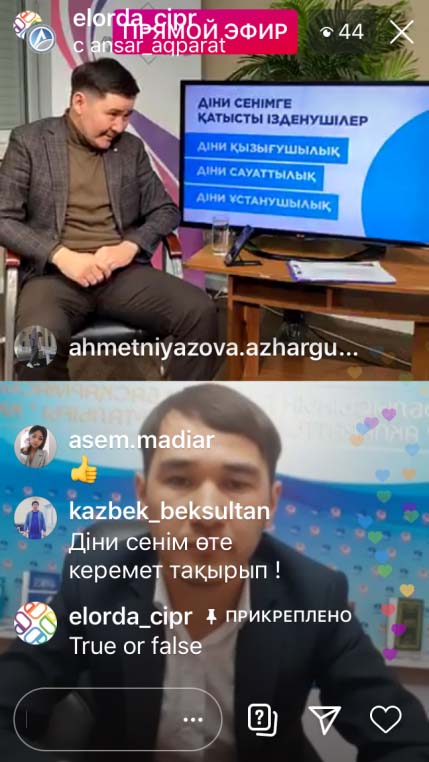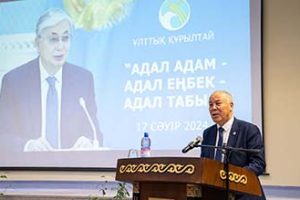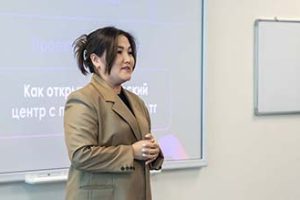Online conversation “Factchecking” True or false (True and false)»
On April 10, 2020, employees of the Department of educational work and social issues of the Academy took part in an online information and explanatory conversation “Factchecking “True or false”, organized by the center for research on religion in Nur-Sultan city together with the center for information analysis “Ansar” of the Aktobe regional Department for religious affairs. The theme of the event was dedicated to problems in obtaining reliable religious information.
Now our country is going through a period when interest in religion is growing. Seventy years of atheism, when everything related to religion was forbidden, left their traces in the fact that people began to turn to various sources of information in search of knowledge. The main sources of information are:
– Internet space,
– registered religious associations
– books
– mentors.
In this regard, it becomes necessary to explain what sources of information can be used by young people who are looking for answers to their questions.
Most often, religious information is searched for in Internet resources. In the search for information concerning religion it is necessary to show:
– critical thinking
– media literacy.
Why is critical thinking necessary? Abroad, much attention is paid to and specially trained in critical thinking. The ability to think critically develops people’s ability to distinguish truth from lies, fake from fact. Also for this purpose, Western countries have launched information portals that promote the development of media literacy. For example, we search for information in the Google search engine. In the search bar for information, we set the topic that interests us, and Google gives us everything that is available on this topic. The developed search engine WolframAlpha gives out only the information that has passed religious verification. Unfortunately, this platform only works in English. However, there are many translation apps available now, so there should be no problems using this search engine.
Unfortunately, destructive religious movements of an extremist nature also use all modern opportunities to recruit people to their ranks.
Where does the fake come from? There are major news sites in the World, such as “the New York Times”, “The Guardian”, “the Washington Post”, etc. When a destructive religious organization puts up information posts on its pages, they indicate these sites as the source of information, with only one change – they change one letter in the name of the site. As a rule, people do not notice this. So there are various pictures that call for “justice” and revenge, which are not related to the events that took place. You can check this by dragging the mouse cursor to the picture and clicking on the right mouse button, where the link “Find a picture in Google”will appear. So you can establish the actual origin of the picture and its involvement in the information issued. It is worth noting that in our Country, the dissemination of false information is punishable by article 274. “Dissemination of deliberately false information” of the Criminal Code of the Republic of Kazakhstan.
Today, there are several sites that provide information about the people who create the sites, their location, and so on. So:
- 1) http://whois.domaintools.com/ – here you can find out when, by whom and where the site was opened;
- 2) https://liveuamap.com/ – covers reports on security and conflict around the world. Here you can view a map and reliable information about incidents in the regions of military conflict;
- 3) https://tineye.com/ – shows in which year the picture or photo was released, and on which Internet resources it is used;
- 4) https://pipl.com/ and https://webmii.com/ – sites that provide reliable information about a person.
- As for the information given out, we must take into account the peculiarities of human perception of information. When a person receives certain information they analyze it in three categories:
Do you like the information or not?
Is it safe for me and my family, important people or not?
Do I get the information or not?
If the information is not liked, or it is a threat to others (for example: the information given out calls into question the one that was said by significant people), then the person stops listening. It often happens that information is so complex that it is difficult to assimilate it. Therefore, when building a dialogue with the interlocutor, you should take these features into account. Since people often have different levels of awareness, they do not always understand the content of what is said. Destructive religious movements follow these simple rules very well. Therefore, they easily manage to lead young people away. Now they do not use complex ways to recruit into their ranks. They don’t travel by region, but use social networks. Not only young people, but also middle-aged people and active users of social networks fall into the traps of their fake pages. Religious Affairs Centers that have opened all over Kazakhstan are constantly monitoring various social networks. These events showed that you can find dangerous messages that form a destructive worldview in user discussions, even on the pages of official religious organizations.
Now it is increasingly possible to meet young people who do not respect national traditions, symbols of the state. They say that the Anthem is a song, and the song is Haram.
We are a secular state with freedom of religion. But there are people who believe that our state system is a shirk, that is, related to a grave sin. They do not take into account the laws of the country, the order of society. Destructive religious organizations were closed, but the people who were among them remained with a destructive worldview. And this sets a dangerous precedent in society.
Therefore, it is necessary to study and learn the traditions of their people. Know well the path of their ancestors, the history of the Country. Don’t trust anyone who talks about religion. All heard pass through criticism, checking personally every fact said. Kazakhstan has officially adopted the Maturidi religious school of the Hanafi mazhab. All mazhabs are trained through these schools. If you have any questions about religion, you can contact the center for research on religion in Nur-Sultan on their instagram page @elorda_cipr.


